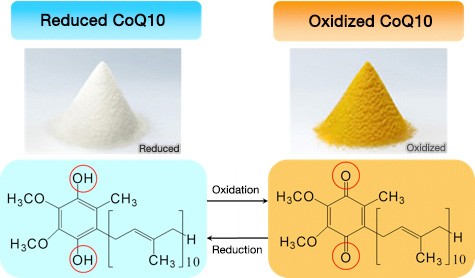Fool-proof CoQ10 Benefits To Get You On Top Of The Energy League !
The CoQ10 benefits are far beyond your imagination. Co-enzyme Q10, also known as CoQ10, is a compound that helps generate energy in your cells.
Millions of people in the western world are struggling with heart disease.
A condition that not only takes its toll on a person’s health, but on the wallet too.
For example, statin drugs, which are prescribed to lower cholesterol in the belief the drugs will help prevent heart attacks, are top sellers for drug companies.
At their peaks before losing their patents, Crestor made $6.6 billion a year at its peak; Lipitor $14 billion in one year; and Pravachol and Zocor $4 billion and $3 billion, respectively.
And now that a new injectable drug to lower cholesterol that costs $14,000 per patient per year is on the market.
Current forecasts indicate that cholesterol-lowering drugs alone will make Americans’ health care costs “unsustainable.”
At least 1 in 4 Americans over 40 years old is taking statins to lower their risk for cardiovascular conditions and stroke.
However, statins have major serious side effects, including liver and muscle damage.
These are important issues that you may want to discuss with your doctor if he has prescribed you statins.
There is something else you might want to discuss as well. If your doctor doesn’t mention it — and that would be to add a daily CoQ10 supplement to your health regimen.
But what is CoQ10, and how can it benefit your health and heart?
What Is CoQ10?

CoQ10, short for coenzyme Q10, is an antioxidant that the body naturally produces in your mitochondria.
There are two forms of CoQ10: ubiquinone and ubiquinol.
 CoQ10’s reduced form that’s considered a far more effective alternative because it’s eight times better absorbed.
CoQ10’s reduced form that’s considered a far more effective alternative because it’s eight times better absorbed.
CoQ10 is crucial for the production of adenosine triphosphate (ATP), which aids in providing energy for your body’s cells.
In his book, “The Sinatra Solution: Metabolic Cardiology,” cardiologist Dr. Stephen Sinatra notes that your body, because of reductase enzymes, can convert CoQ10 into ubiquinol from the foods and supplements you eat and take.
However, as you age your body produces less CoQ10. At this point, CoQ10 supplements may be vital to help optimize your body’s levels and alleviate certain conditions.
You can find CoQ10 in capsule, tablet and IV forms. It’s also an ingredient for skincare products.
Food Sources Of CoQ10
 There are foods with CoQ10 you can eat to help increase your body’s levels of it.
There are foods with CoQ10 you can eat to help increase your body’s levels of it.
Notable examples of CoQ10-rich foods include:
- Fish like wild-caught Alaskan salmon, sardines and mackerel
- Grass fed beef and organ meats
- Organic pastured chicken
- Sesame seeds
- Broccoli
Researches highlighted the positive impact of eating chlorophyll-rich vegetables exposed to sunlight.
Apparently they help promote CoQ10 production.
You can increase your chlorophyll intake by eating these vegetables, ideally organic:
- Spinach
- Asparagus
- Beet greens
- Bok Choy
- Brussels sprouts
- Green cabbage
- Collard greens
- Cucumber
- Green beans
- Green peas
- Kale
- Mustard greens
- Swiss chard
- Parsley
High-quality pistachio nuts and organic kiwi fruits are also in the list.
Just make sure to consume kiwi in moderation since they contain fructose, which can upset your mitochondria when consumed in high quantities.
Notable Health Benefits of CoQ10

CoQ10 provides positive impacts to cardiovascular health.
For instance, elderly Swedish subjects between 70 and 88 years old who took CoQ10 supplements together with selenium reported improved heart function and significantly decreased risk for death due to cardiovascular causes.
In other studies, CoQ10 was also able to help decrease effects of oxidative stress-triggered mitochondrial dysfunction, minimize mitochondrial damage and promote production of new mitochondria, particularly in the brain.
Findings Show That CoQ10 Also Delivers The Following Health-Boosting Properties:
- Anti-inflammatory —Ubiquinol may have effects on two markers linked to cardiovascular diseases: N-terminal pro-brain natriuretic peptide (NT-proBNP) and gamma-glutamyl transferase (GGT). In a 2015 study, elderly subjects with higher ubiquinol serum levels had reduced quantities of NT-proBNP, helping reduce their risk of heart failure.31 Meanwhile, authors of a 2014 article noted that ubiquinol supplements assisted in reducing serum GGT activity and effects of oxidative stress in humans.32
- Antioxidant —CoQ10 can help combat free radicals and lessen their damage33as it’s a fat-soluble antioxidant found in your cell membranes and mitochondria.34
There’s also research suggesting that CoQ10 aids in enhancing the health of your:
- Heart —The book “High Blood Pressure: Arrest This Silent Killer Before It Strikes and You Will Add Years to Your Life” says that CoQ10 may aid in increasing your heart’s ability to pump more powerfully, possibly enabling circulation and better blood flow throughout your body. However, the mechanism responsible for this needs further research and studies.
- Skin —Your CoQ10 levels decrease as you get older, and reduce your body’s ability to produce collagen and elastin. These two skin proteins are responsible for boosting your skin’s strength and elasticity (collagen), and pliability and resilience (elastin). If your body contains insufficient amounts of these proteins, wrinkles and saggy skin may appear.
CoQ10 may also have ability to combat free radicals responsible for cell damage. CoQ10 is able to penetrate into your skin and deliver antioxidant effects. They can aid with regulating your cells’ energy levels.
What Does CoQ10 Do?

Among the major CoQ10 benefits, it is good for the body’s cells, as it’s essential for producing the energy they need.
Supplements containing this antioxidant not only will help address a CoQ10 deficiency, but also may help with:
- Migraines
- Diabetes
- Fatigue caused by fibromyalgia
- Arrhythmia
- Heart failure
- Mitral valve prolapse (ideally in combination with magnesium)
- Heart transplant candidates
- Age-related macular degeneration
- Diabetic neuropathy
- HIV/AIDS
- Muscular dystrophy
Multiple Studies Have Revealed That CoQ10 Has Potential In Reducing High Blood Pressure Levels
People with blood pressure-related problems may find CoQ10 supplements useful, as lower levels were noticeable among those with high blood pressure.
CoQ10 supplements improve fertility effects too.
The presence of CoQ10 in semen may result in improved antioxidant abilities and yield positive impacts toward sperm concentration, morphology and motility.
An animal study done on aged subjects also showed that CoQ10 supplements assisted in promoting ovulation, inhibiting loss of ovarian reserves and boosting mitochondrial function.
Studies Conducted On CoQ10 Benefits

Interest surrounding CoQ10 after its discovery in 1957 grew and paved the way for researchers to conduct studies with it.
In fact, British biochemist Peter Mitchell, Ph.D., won the 1978 Nobel Prize in biochemistry because he thoroughly described cellular power production, which involved CoQ10.
Other studies also found that CoQ10 may assist with:
- Addressing migraines —Nutritional deficiencies, particularly of CoQ10, vitamin D, alpha-lipoic acid, magnesium and many more, may play a role in the onset of migraines. This is an important breakthrough. Migraines affect at least 1 in 7 Americans yearly and the WHO has placed them as the “sixth highest cause worldwide of years lost due to disability.”
In 2015, a randomized, placebo-controlled and double-blind trial proved that a commercial formula containing CoQ10, riboflavin (vitamin B2) and magnesium could reduce migraine frequency and lessen its intensity, compared to a placebo.
A 2016 study conducted by Dr. Suzanne Hagler and colleagues at the Cincinnati Children’s Headache Centre highlighted that children, teenagers and young adults who often dealt with migraines had mild deficiencies of CoQ10 and vitamins B2 (riboflavin) and D.
Girls And Young Women Were More CoQ10-Deficient, While Boys And Young Men Were More Vitamin-D Deficient
However, more research is paramount to fully confirm this link.
- Combating cardiovascular issues —The Q-Symbio study, which was conducted in 2014, involved 420 people who were randomly chosen to take either a 100-milligram dose of CoQ10 three times a day or a placebo, and underwent therapy during the course of the study. Results indicated that CoQ10 supplements played a role in:
- Lessening cardiovascular mortality (9% for the CoQ10 group versus 16% for the placebo group) and all-cause mortality (10% for the CoQ10 group versus 18% for the placebo group)
- Reducing hospital stays due to heart failure
- Alleviating mitochondrial disorders and neurodegenerative diseases —A 2004 animal study showed that CoQ10 was able to raise brain concentrations among mature and older animals. This effect proved the CoQ10’s potential in helping alleviate mitochondrial disorders and neuro-degenerative diseases like Parkinson’s disease, Huntington’s disease and amyotrophic lateral sclerosis (ALS).69
- Predicting dementia risk —Authors of a 2014 study revealed that CoQ10 levels may serve as a predictor for the onset of dementia.70
- Boosting exercise performance —Subjects in this 2008 study who took CoQ10 supplements had higher amounts of it in their muscles, experienced less oxidative stress during and after exercise and reported increased exercise endurance.71
How Should You Take CoQ10?
Because it’s a fat-soluble nutrient, CoQ10 supplements shall be consumed with a fatty meal or a small amount of healthy fat like coconut oil, olive oil or MCT oil.
Before taking CoQ10, though, talk to your physician to help determine the ideal dose needed for your condition. CoQ10 levels may be checked via multiple types of tests.
Side Effects Of CoQ10
Generally, CoQ10 supplements are safe, although they can cause diarrhea, nausea, heartburn, headaches, rashes, fatigue and dizziness.
However, unless they’re given under the supervision of a health care provider or physician, CoQ10 supplements should be avoided by people younger than 18 years old.
The same principle applies if you’re pregnant or breastfeeding, since studies are lacking regarding CoQ10’s effectiveness and safety for both groups.
CoQ10 Supplements May Interact With The Following Drugs Too:
- Chemotherapy drugs like daunorubicin (Cerubidin) and doxorubicin (Adriamycin) —If you’re undergoing chemotherapy, talk to your oncologist before taking antioxidants or supplements.
- Blood pressure medications like diltiazem (Cardizem), metoprolol (Lopressor or Toprol), enalapril (Vasotec) and nitroglycerin (Nitrostat or Nitrobid) —CoQ10 supplements are said to boost the effectiveness of these medications, but more research is needed to support these findings.
- Timolol drops (Betoptic) for glaucoma —Taking CoQ10 may reduce its heart-related side effects without inhibiting its effectiveness.
- Anticoagulants like warfarin (Coumadin) —These drugs’ effects may be reduced if you take CoQ10 supplements alongside them, and may raise your blood clot risk.
Penn State’s Milton S. Hershey Medical Centre adds that taking the following medicines can lower your body’s CoQ10 levels:
- Statins for cholesterol like atorvastatin (Lipitor), lovastatin (Mevacor), pravastatin (Pravachol) and simvastatin (Zocor)
- Fibric acid derivatives for cholesterol like gemfibrozil (Lopid)
- Beta-blockers for high blood pressure like atenolol (Tenormin), labetolol (Normodyne), metoprolol (Lopressor or Toprol) and propranolol (Inderal)
- Tricyclic antidepressants like amitriptyline (Elavil), doxepin (Sinequan) and imipramine (Tofranil)
CoQ10 Benefits: This Antioxidant May Be More Important Than You Realize
Optimizing your body’s CoQ10 levels can be a good decision, especially if you’re keen on improving your overall health and enhancing your body function. Most research surrounding this antioxidant is positive, providing substantial evidence that highlights its importance.
Despite its numerous uses and benefits, remember that CoQ10 supplements aren’t a magic pill that’ll immediately heal your ailments. While raising your body’s levels of this nutrient is important, maintaining a healthy lifestyle that focuses on eating nutritious food and exercising on a frequent basis should still be your main priorities.
Frequently Asked Questions About CoQ10
Q: What is CoQ10 made from?
A: CoQ10 is a substance similar to a vitamin that the body naturally produces, and is in the mitochondria.
Q: What does ubiquinol do for your body?
A: Ubiquinol is the reduced form of CoQ10. While information about its benefits may be lacking because most studies are focused on the full form of CoQ10, initial research has stated that it may help:
- Lower blood pressure levels
- Reduce exercise-induced muscle damage
- Inhibit adverse effects that may be triggered by free radicals and oxidative stress
Q: Is CoQ10 safe?
A: A safety assessment published in 2008, which was based on data from both preclinical and clinical studies, revealed that CoQ10 is safe to use as a dietary supplement.
However, it’s said to cause diarrhea, nausea or heartburn in some people, as well as interact with other medicines.
If you’re interested in CoQ10 supplements, consult your physician to learn if it’s safe for you and what the ideal dose for your condition is.
Q: Is CoQ10 good for lowering cholesterol?
A: CoQ10 may be useful if you have high blood pressure or cholesterol levels, because your body’s stores of this antioxidant may be low at this point.
Not much evidence has shown if CoQ10 supplements are ideal for lowering cholesterol levels.
However, there’s initial research showing CoQ10 supplements may decrease side effects caused by statins that lower cholesterol levels.
Q: Should I take CoQ10?
A: If you’re not sure if you need to increase your body’s CoQ10 levels or not, talk to your doctor.
Some tests may be suggested to check your body’s levels of this antioxidant.
People under 18 years old and pregnant or breastfeeding women should not take CoQ10 supplements.
Q: How much CoQ10 should you take if you are on statins?
A: If you plan on taking statins at the same time as CoQ10 supplements, consult your doctor to determine the right dosage for your condition.